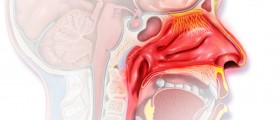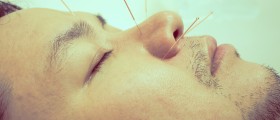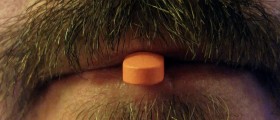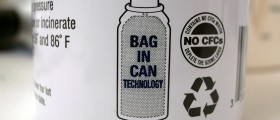Rhinitis is a common nasal disorder featured by an inflammation of the nasal passage. Irritation and inflammation of internal areas of the nose cause rhinitis symptoms such as runny nose, postnasal drip and nasal congestion. These symptoms are caused by excess production of mucus secreted by the lining of the nasal passage.
There are three types of rhinitis: infective rhinitis, non-allergic rhinitis and allergic rhinitis. Bacterial or viral infections cause infective rhinitis while allergy-causing agents lead to allergic rhinitis. Non-allergic rhinitis is classified into different types depending on the cause. Types of non-allergic rhinitis include autonomic, vasomotor, hormonal, drug-induced, atrophic, gustatory rhinitis and rhinitis medicamentosa.

Gustatory Rhinitis Overview
Gustatory rhinitis develops after consuming certain foods, particularly hot and spicy foods. Gustatory rhinitis may develop in both children and adults and individuals affected by allergic rhinitis as well as heavy smokers are especially at risk.- Previous studies have reported that rhinorrhea is more prevalent in patients with PD (24–50%) than in normal controls (6–26%). Furthermore, 38% of patients with PD with rhinorrhea reported worsening of rhinorrhea while eating. Despite these reports, there is no report of excess rhinorrhea in other parkinsonism-related disorders. To the best of our knowledge, this is the first detailed case report of rhinorrhea in patients with MSA.
- PD, multiple system atrophy, dementia with Lewy bodies, and pure autonomic failure are categorized as synucleinopathies, a group of neurodegenerative diseases caused by an abnormal accumulation of misfolded phosphorylated ?-synuclein in the neurons, glia, or both. Autonomic dysfunction is observed in synucleinopathies. The sympathetic nervous system tends to be affected more than the parasympathetic system, which is indicated by the higher rate of orthostatic hypotension and cardiac sympathetic denervation.
- Therefore, the majority of autonomic nervous symptoms in these patients are based on the deficiency of sympathetic tone and relative predominance of parasympathetic tone. The observation of rhinorrhea is in line with this rationale, because it is caused by parasympathetic nerve hyperactivity in the nasal glands.
- Although there is no direct evidence that the pathology of multiple system atrophy causes gustatory rhinitis in our patient, the time lapse between the two events suggests a strong relationship. Pathological examination of the nasal mucosa revealed little inflammatory cellular infiltration in the mucosa, suggesting that rhinorrhea is more likely to be associated with autonomic dysfunction rather than with inflammation. However, the measured amount of nasal secretion during eating was not reduced after posterior nasal neurectomy. This may be because parasympathetic fibers innervating the anterior region of the nasal mucosa are involved in this pathophysiology.
Causes of Gustatory Rhinitis
Gustatory rhinitis is caused by overreaction of the vagal nerve in the nervous system of a person when he or she ingests certain foods. The leading cause of gustatory rhinitis is consumption of hot and spicy food, but alcohol intake can be the culprit too. Also, food preservatives and colorings can sometimes cause gustatory rhinitis.
Symptoms of Gustatory Rhinitis
Symptoms of gustatory rhinitis are generally temporary and resolve within a few minutes or a few hours after ingestion of the food triggers. The most common symptom of the condition is runny nose. Nasal discharge is commonly clear and watery. It is believed that this nasal discharge is caused by dilation of blood vessels in the nose that is supplied by the vagal nerve. Stuffy nose and sneezing are also associated with gustatory rhinitis.
Prevention and Treatment of Gustatory Rhinitis
To prevent gustatory rhinitis occurrence one must stay away from food and drinks that trigger the condition. Some health care providers may recommend use of antihistamine nasal sprays one hour before mealtime to reduce the intensity of nasal discharge and other symptoms. However, since the condition is not caused by the response of the body’s immune system and there is no release of histamines, antihistamines cannot effectively treat gustatory rhinitis.
Gustatory rhinitis is usually treated by corticosteroid nasal sprays, mucolytic drugs, decongestant nasal sprays and anticholinergic agents. Over-the counter saline nasal sprays can be also used in treatment of gustatory rhinitis. Still, the treatment commonly varies from patient to patient depending on the underlying cause.
All in all, people who frequently experience symptoms of gustatory rhinitis should consult an otolaryngology specialist for a proper diagnosis and treatment of the condition.






_f_280x120.jpg)






-Does-It-Help-Treat-Allergic-Rhinitis_f_280x120.jpg)



Your thoughts on this
Loading...